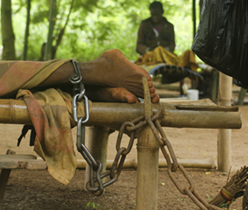 Amnesty International has called on government to institute measures to guarantee continuous improvement in its human rights record.
Amnesty International has called on government to institute measures to guarantee continuous improvement in its human rights record.
It said, although Ghana’s human rights situation was improving steadily compared to most countries in Africa there was still much to be done.
Mr Lawrence Amesu, Director of Amnesty International Ghana, made the call in a presentation on the launch of the 2013 report in Accra on Thursday.
Mr Amesu said: “If we compare the human rights situation in Ghana to those in most African countries …Ghana’s human rights situation is improving gradually but steadily.
“However…there remains a lot to be done …to continue to improve on our human right records.”
According to the report, over one thousand people were forcibly evicted from their homes in Accra in January 2012, while the Accra Metropolitan Assembly demolished about 500 houses and structures along the railway lines.
Mr Amesu said over 1,500 people were left homeless while thousands more remained at risk of forced eviction.
Violence continued against people suspected of same-sex relationships, who still had little or no legal protection, he added.
The report indicated that though no executions were carried out, 27 men were sentenced to death in 2012, while 166 people were on death row, including women.
It added that death penalty was still on the statute books, despite the government having accepted recommendations to abolish it.
Mr Amesu observed that violence against women remained rife, with nearly 10,000 cases reported to the Ghana Police Domestic Violence and Victims’ Support Unit until 2012.
Violence against women was thought to be under reported and not also adequately addressed by the authorities, he added.
The criminal justice system remained slow, access to legal aid was limited or non-existent and some prisoners spent years waiting to be tried, adding in March, 200 were transferred to the maximum security Ankaful Prison in an attempt to address overcrowding.
Amnesty International has, therefore, called on Ghana government to continue to make human rights central to its political programme and to commit itself to implement a clear agenda for human rights.
It has subsequently asked Ghana to ensure full compliance with Ghana’s international and regional human rights obligations and commitments, as explicitly set out in the treaties it has ratified.
Nana Oye Lithur, Minister of Gender, Children and Social Protection, said government was committed to addressing human rights issues through advocacy programmes and social interventions.
She said a national campaign advocacy programme had been developed on forced marriages, while government was prepared to apply information and communication tools to raise awareness on human rights situations.
She added that about 20 to 30 social intervention programmes had been developed, some of which included livelihood empowerment programme to disburse money to about 71,000 households and to scale it up to 150,000 by January 2015.
Nana Lithur said the President was also committed to passing the Right to Information Bill and the broadcasting bill into laws and in addition see to the revision of the death penalty.
Source: GNA











